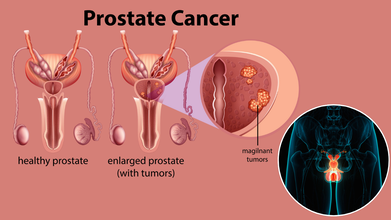- Health Conditions A-Z
- Health & Wellness
- Nutrition
- Fitness
- Health News
- Ayurveda
- Videos
- Medicine A-Z
- Parenting
- Web Stories
Prostate Cancer Rates Climb Again After A Decade Of Decline: 80% Of Americans Don’t Know Early Stage Disease Has No Symptoms

Credits: iStock
Prostate cancer deaths in the United States were on the decline, thanks to advances in screening and treatment but new data from the American Cancer Society (ACS) shows that the tide is shifting — prostate cancer rates have been climbing steadily for the past decade, particularly in advanced stages of the disease. At the same time, a new national survey highlights a troubling gap in public awareness, 80% of Americans don’t know that early-stage prostate cancer often has no symptoms, underscoring why early detection remains such a challenge.
According to the ACS’s latest prostate cancer statistics report, diagnoses of prostate cancer have increased by about 3% per year since 2014. This rise is particularly striking given that the decade before saw a 6.4% annual decline. What is most concerning is not only that more men are being diagnosed, but that more cases are being caught at advanced stages. The report notes that advanced-stage diagnoses are climbing at an even faster rate — up to 6.2% annually, depending on the age group.
Mortality trends add another layer of concern. In the 1990s and 2000s, prostate cancer death rates declined by 3% to 4% per year. Over the past decade, however, that rate of decline has slowed dramatically to just 0.6% annually.
Why is Prostate Cancer Screening Still Debatable?
One reason for the reversal may lie in the U.S. Preventive Services Task Force’s (USPSTF) guidance from the early 2010s, which advised against routine prostate-specific antigen (PSA) screening. The goal was to reduce overdiagnosis and overtreatment, as PSA testing can detect cancers that are slow-growing and unlikely to ever cause harm.
But the shift away from routine screening may have had unintended consequences. With fewer men undergoing PSA tests, cancers are now being discovered later and at more aggressive stages. “We actually see PSA testing this decade versus the previous decade going down, so the incidence [of prostate cancer] is going up despite less testing occurring,” experts from ACS noted. “That starts to speak to other factors that might be environmental or nutritional or other things that we don’t fully understand.”
The paradox is clear: cutting back on PSA tests may have reduced overdiagnosis, but it may also be fueling the resurgence of advanced-stage disease.
Why Are Americans in the Dark About Prostate Cancer Detection?
Compounding the problem is public misunderstanding of prostate cancer symptoms. A nationwide survey conducted by The Ohio State University Comprehensive Cancer Center revealed that four out of five Americans don’t know early-stage prostate cancer often has no symptoms at all. Most cases are detected only through routine screening, usually via a blood test for PSA levels.
The survey also found that 59% of respondents did not know sexual dysfunction can be a warning sign. Often, it’s partners who first notice these changes and encourage men to seek medical care. Other lesser-known symptoms — such as fatigue or unexplained weight loss — were better recognized by Black adults than by white adults, but Black respondents were less likely to know that early-stage disease can be asymptomatic.
This knowledge gap matters. When men assume they’ll feel ill if something is wrong, they’re less likely to prioritize regular screenings.
The ACS report also highlights stark racial disparities. Black men are twice as likely to die from prostate cancer as men from any other racial or ethnic group. Native American men, meanwhile, have a 12% higher death rate compared to white men despite a 13% lower incidence of the disease.
The reasons for these disparities are complex, involving a mix of biology, access to care, socioeconomic factors, and structural inequities in healthcare. What remains clear is that certain populations are paying a higher price for gaps in screening and treatment access.
Most common cancer in US men, Prostate cancer accounts for about 30% of male cancer diagnoses in 2025. Second leading cause of cancer death: After lung cancer, prostate cancer kills nearly 36,000 men annually in the U.S.
Annual cases: More than 300,000 American men are expected to be diagnosed in 2025.
Age factor: The majority of cases occur in men over 50.
Why Is Prostate Cancer Screening Crucial?
While the debate over PSA testing continues, experts agree on one point: men need to have informed conversations with their doctors about screening. The ACS and other organizations recommend that men aged 45 and older talk with their healthcare providers about the benefits and risks. For those at higher risk including Black men and those with a family history of prostate cancer — those discussions should begin as early as age 40.
Screening can be a double-edged sword. It may detect cancers that grow slowly and never cause harm, but it can also catch aggressive cancers before they spread. Without it, many men may not realize they’re sick until it’s too late for curative treatment.
Ohio State Cancer Center patient Daryl Wilber and his wife, Jodi, were shocked when a routine blood test revealed he had early-stage prostate cancer. He had no symptoms. For Jodi, the lesson is clear: partners play a vital role in men’s health. “Help them get over that hump from going from ‘Yeah, yeah, yeah, I know I should do it’ to, ‘OK, I’m going to go tomorrow and do it,’” she said.
Their story echoes what oncologists stress — early detection saves lives. Because prostate cancer often progresses slowly, finding it early greatly improves survival odds.
What are The Pros and Cons of Screening?
PSA testing and digital rectal exams remain the two primary tools for early detection. But both come with limitations. Elevated PSA doesn’t always mean cancer, and not all prostate cancers need immediate treatment. Some may never grow large enough to cause harm, leading to unnecessary treatments that carry risks such as urinary incontinence and erectile dysfunction.
That’s why many doctors recommend “shared decision-making”, weighing the risks and benefits together with the patient. Screening is not a one-size-fits-all solution. The right approach depends on age, race, family history, and personal health values.
The ACS projects nearly 314,000 new prostate cancer cases in 2025. That number, coupled with the slowed progress in reducing mortality, signals a pressing need to rethink screening strategies and public education.
Too many men and their families still believe symptoms will be obvious. Too many assume prostate cancer is always slow-growing. And too many at-risk populations lack access to timely testing and care.
Why Do I Keep Having Stressful Dreams About School? What Do These Recurring Dreams Mean?

It's a simple Monday morning, the sun’s up bright and early, the weather is pleasant, but the anxiety strikes me as soon as I open my eyes. It's the dreaded 10th grade Math exam, the one subject I never excelled at. As if it wasn’t enough that the exam could make or break whether I get enough overall grade to get into my dream schools, if I were to get a bad score on this, it would be a permanent mark on my record.
“I had studied enough, I can do this” I told myself, but what was the point my admit card was nowhere to be found. I searched high and low, my anxiety peaking with every passing minute. “I thought I got up in time? Why am I late, they’ll never let me into the exam hall” I could hear my heartbeat in my ears and it’s getting louder, louder and louder, until it's just a loud long noise. Next thing I know, I’m on my bed, I graduated 10th grade years ago and this was a dream.
What Do Stressful Dreams About School Say About You?
If it isn’t your school exam, then maybe your college entrance exam or perhaps a qualifying exam that could determine whether you get your dream job or not. Recurring dreams about school happen to a lot of us.
These dreams are very common. Experts suggest that they often appear when a person is feeling anxious in their waking life, especially about being evaluated or judged by a boss or another authority figure. These dreams can take many forms: a person might oversleep for an exam, be unable to find their classroom, study the wrong subject, or even show up to school without clothes. The dreams revisit a place where we first experienced success or failure based on our performance.
To understand this, one must know that dreams are a way for the mind to process memories and experiences, both conscious and unconscious. The school setting in these dreams is a stand-in for a feeling of being tested in life and worrying about not meeting other people’s expectations.
Why School is the Go-To Setting
The reason school so often appears as the setting for these anxiety dreams is because it’s where we first learn how to deal with life. Feelings of stress, inadequacy, and embarrassment often happen first in a school environment. These early experiences create foundational beliefs in our unconscious mind about how we handle pressure. For some people, these beliefs can be very hard to change, causing feelings of stress and worry to resurface years later in dreams, even if the beliefs aren't relevant to their adult life.
What Do Recurring Dreams Reveal About Us?
According to the Sleep Foundation, having a recurring dream—the same dream happening again and again—is a sign of an unresolved problem or a difficult emotion in a person’s life. These dreams may be a way for the mind to make sense of past experiences, or they might be a sort of practice run to help a person prepare for a threat or challenge they're facing in real life. The dreams are often a way for the mind to push a person to finally face and deal with a problem.
Another reason for a recurring dream is that it represents a basic psychological need that isn't being met. Experts say everyone needs to feel independent, feel capable, and feel connected to others. Some research has found that people who lack these feelings are more likely to have recurring nightmares with negative themes, such as failing, falling, or being attacked.
Can You Stop Recurring Dreams?
If you're bothered by having the same dream over and over, you can take some steps to try and make them stop. Experts recommend a few different approaches
- Address the root problem. If you can figure out what emotional problems or difficult feelings are causing your dreams, working through them may help the dreams stop.
- Consider therapy. A specific type of therapy called imagery rehearsal therapy is often recommended. With a therapist's guidance, you can practice reimagining the dream with a more positive ending.
- Reduce stress. Since negative recurring dreams are often linked to stress, finding ways to lower your stress levels may also help reduce the dreams.
- Prioritize mental health. People with mental health conditions like depression often have more negative recurring dreams. Treating these conditions can help reduce the frequency of bad dreams.
- Adopt healthy sleep habits. To get a better night's sleep, try to go to bed and wake up at the same time every day. It’s also a good idea to avoid caffeine, alcohol, nicotine, and fatty foods close to bedtime.
- Talk to your doctor about your medications. Some medications, including melatonin, can cause nightmares. Your doctor can advise you on whether changing the dose or stopping the medication might help.
- Treat sleep disorders. If you have a condition like insomnia or sleep apnea, getting treatment for it could help reduce how often you have negative recurring dreams.
Diagnostic Anomaly: Rare Condition Makes This Teen Remembers Everything: She Has Access To Memories That Many Others Don't

At least once in our lives, most of us have dreamed of having a perfect memory. A brain that would remember crucial details at the nick of time, whether it is during your exam or an interview. But this is not just a dream, it is just another day for this young girl, who has a ‘Super Brain’.
Scientifically speaking, she has a very rare condition that makes her remember every detail of her life, like a record. In a 2024 interview by Official W5, Emily Nash, who was 18-year-old at the time of filming, from Ottawa, described her incredible ability to remember everything.
A Person Who Remembers Everything
The video explained how she is one of the few people in the world confirmed to have Highly Superior Autobiographical Memory (HSAM) She can remember the exact date and details of public events, from the death of Queen Elizabeth to celebrity news and movie release dates. Her memory is so precise that she can tell you what she was doing on a specific date, down to what she had for lunch and what was playing on the radio.
Her family even gave her the nickname "Wikipedia" because she was their go-to source for random facts and dates. Emily describes her memory as a "calendar" where each day is like a little movie she can rewind and fast-forward through.
How Is HSAM Different From Having Good Memory?
According to a 2024 study by Neuropsychology Review, HSAM is a very rare and special ability where a person can remember almost every single day of their life in incredible detail. If you give them a specific date, like "January 15, 2003," they can instantly recall what they were doing, what the weather was like, and even what they were wearing. Unlike memory athletes who use tricks to memorize things, people with HSAM do this automatically and without any effort. It feels like a movie playing in their mind. The review confirmed that HSAM is a truly unique type of memory.
It's Fast and Accurate
People with HSAM can recall memories quickly, with amazing detail, and the memories are almost always perfectly accurate.
It Doesn't Fade with Age
A person with HSAM who was studied at ages 75 and 80 still had an incredible memory, showing that this ability seems to resist the normal memory loss that comes with getting older.
It's Only for Personal Memories
The study found that people with HSAM are not better at remembering just anything. They are not smarter, and their memory for general facts, names, or things they learned in a textbook is normal—only their memory for their own life is special.
How Do People With HSAM Remember Everything?
The study explained what goes on inside the brains of people with HSAM.
Brain Activity
When people with HSAM recall a memory, their brain activity goes into overdrive. Areas that are normally used for memory light up much more intensely. This suggests that their memories are more vivid and that the brain's "memory network" is working at a much higher level.
Brain Structure
Interestingly, the physical structure of their brains doesn't appear to be bigger or different in size. Instead, the main difference is in the way certain brain regions are connected, particularly the hippocampus, which is a key part of the brain for memory. This suggests that the special memory isn't because of a bigger brain but because the brain's connections are wired differently.
How Does Researching HSAM Help Brain Health?
Understanding HSAM could be incredibly important for the future. By figuring out how these rare individuals remember so well, scientists might be able to develop new strategies to help people with memory problems, such as those caused by diseases like Alzheimer's. It could also help improve the accuracy of eyewitness testimony in legal cases. Ultimately, this research gives us a unique window into how memory works and how it might be strengthened.
Psychologist Says You Don't Need To Talk About Your Feeling In Conflicts: Here's What Emotionally Intelligent People Do

(Credit-Canva)
Emotional Intelligence (EI) is not something many people understand. We all develop this skill as we age and meet more people, however, the learning curve may be different for all of us. But why do we even need to be emotionally intelligent? And how is it a skill? This is not just a social phenomenon, but a complex inter-emotional communication that one needs to learn.
In simpler terms, you as a person need to have the ability to recognize your own feelings, manage them as well as understand other people. The best example of it would be when a young child who never had to share suddenly gets a sibling.
Now everything that belonged solely to the child gets divided, like the parent’s love and affection. In turn, the child acts out in different ways, like throwing tantrums, crying and pouting so that the attention is on them again. It is now the parents’ turn to teach children what they’re feeling and how to manage these feelings.
However, as you grow up, the situations are much more complicated, so are your feelings and you will still encounter people you may not understand or some situations. So how do emotionally intelligent people go about handling things like this. The first answer would be to explain yourself, expressing your feelings and showing your intent. But you are going about this the wrong way.
Tessa West, social psychologist and professor at New York University, speaking to CNBC News says even when you run into a difficult situation like a conflict with a spouse, leaving your feeling bare won’t help the situation as much. So, what do you do? She explains in 3 points what emotionally intelligent people do in difficult situations.
Smart Ways To Handle Conflict
Most people are taught that when you're in a conflict, the first thing you should do is tell the other person how you feel. But a social psychologist says this isn't always the smartest move. True emotional intelligence is not just about expressing feelings but also knowing when to do it. Sometimes, it's better to talk about what happened first.
We Don’t Always See the Same Thing
It’s easy to assume that everyone sees a situation the same way you do. You might feel disrespected because a coworker cut you off in a meeting. But that coworker might have done it because the meeting was almost over, and they had to make a decision.
Instead of starting with your feelings, a better approach is to talk about the specific event. You could say, "Here's what I remember happening. What's your side of the story?" This shows that you're open to hearing their perspective and aren't assuming you're right.
Our Guesses About "Why" Are Often Wrong
It's natural to assume you know why someone did something. But these assumptions are often wrong and can be hurtful. People tend to think the worst if they don't trust the other person.
A better way is to ask for their reasons. You could say, "I made some guesses about why you did that, but I'd love to hear your side." Admitting your assumption helps calm things down and makes room for a real conversation. The reason for their action might be something you never even thought of.
Talk About Feelings Later
Once you've cleared up what happened and why, your feelings might change. With a better understanding, you might not be as upset as you were before.
This is the right time to talk about how you feel. By waiting, you can have a more productive conversation. This approach helps build stronger relationships because it’s based on understanding each other, not just on emotions.
© 2024 Bennett, Coleman & Company Limited

